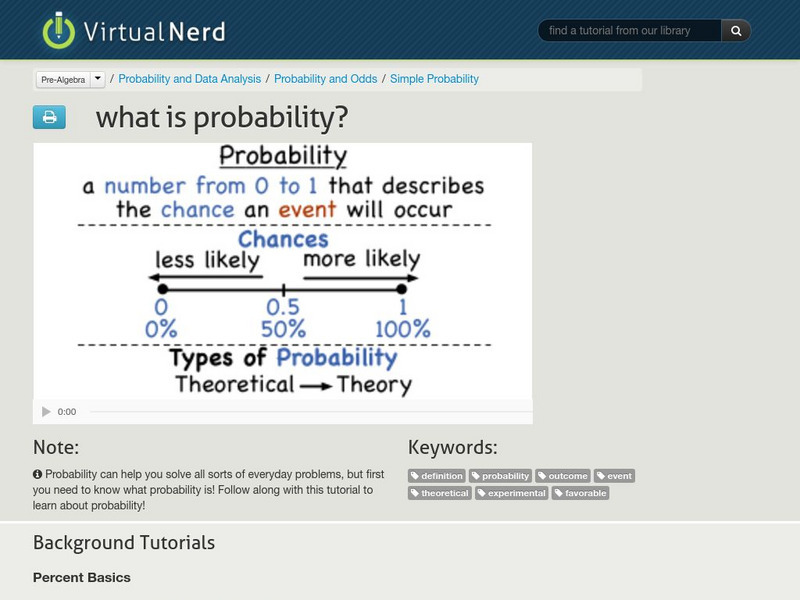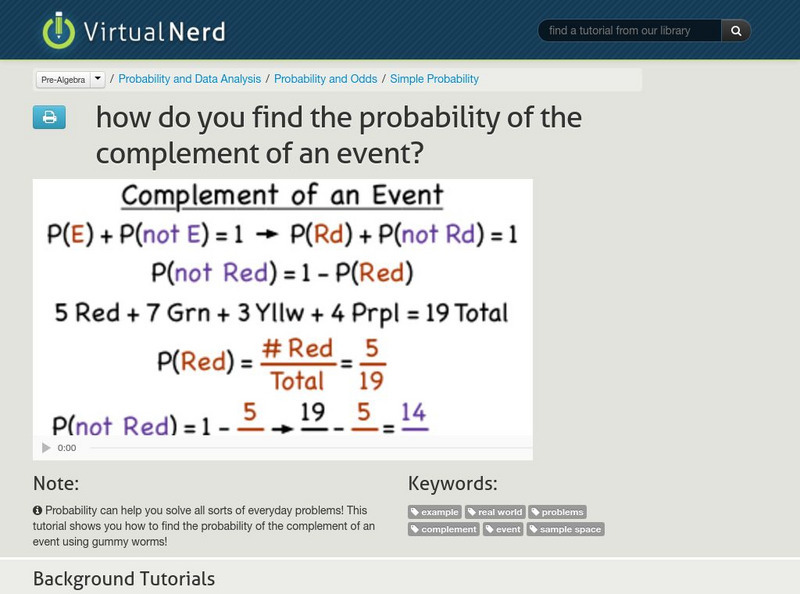Curated OER
How Do You Find the Probability of a Simple Event?
A bag contains marbles of different colors. You put your hand in the bag to grab a marble. What are your chances of picking a given color? Learn how to set up this probability word problem and then solve it.
Curated OER
What is an Unbiased Sample?
Transmit to your class what an unbiased sample is with this video. The video goes into detail about what an unbiased sample looks like, providing examples and listing several different types of random sampling. This could be used when...
Curated OER
How Do You Find the Volume of a Rectangular Pyramid?
How do you find the volume of a rectangular pyramid? Watch this video and find out! In the tutorial, a lecturer works through an example problem. While she works, she describes each step and each formula necessary to solve the problem. A...
Curated OER
How Do You Find the Volume of a Triangular Pyramid?
Instruct your class on how to find the volume of a triangular pyramid using this tutorial. Learners can watch the video and take notes, later applying what they have seen to class work or homework. A clear video with direct instruction,...
Curated OER
How Do You Find the Volume of a Triangular Pyramid?
Instruct your class on how to find the volume of a triangular pyramid using this tutorial. Learners can watch the video and take notes, later applying what they have seen to class work or homework. A clear video with direct instruction,...
Curated OER
5th Grade: Dividing Fractions
This clip may be of some use, provided either as a tutorial for students or a methodology for a teacher. Dividing fractions is described and associated as flipping and dipping similar to rip and dip at Pizza Hut. Note: This video appears...
Curated OER
What is the Associative Property?
A straightforward definition of the associative property of addition and multiplication, this resource could be used to help learners tackle the concept. You might consider giving the link to struggling class members so they can use it...
Curated OER
What is an Unbiased Sample?
Transmit to your class what an unbiased sample is with this video. The video goes into detail about what an unbiased sample looks like, providing examples and listing several different types of random sampling. This could be used when...
Curated OER
How Do You Find the Volume of a Rectangular Pyramid?
How do you find the volume of a rectangular pyramid? Watch this video and find out! In the tutorial, a lecturer works through an example problem. While she works, she describes each step and each formula necessary to solve the problem. A...
Curated OER
Scientific Notation 1
Scientific notation is defined and used to express the number 0.0000000003457. This concept is not as clearly defined as it could be, and is probably not suitable for those who have not had prior experience with the concept.
Curated OER
How Do You Find an Average?
How do you find an average of something? Watch this video and see how you can add up all your elements then divide by the number of elements you added up. So simple!
Curated OER
How Do You Use a Tree Diagram to Count the Number of Outcomes in a Sample Space?
Deciding what to wear can be difficult, but it helps if you know your options. Use a tree diagram to solve word problems like the one in this video! Class members can watch and learn how to find and count possible outcomes (or outfits)....
Curated OER
What is the Median of a Data Set?
Mean, mode, median? What's the difference? How do you find them? The teacher focuses on explaining median in this video. She gives a good explanation and shows several examples using different sets of numbers.
Curated OER
What is Numerical, or Quantitative, Data?
The teacher gives a very thorough explanation of numerical or quantitative data being anything where the answer to a question would be a number. Whereas any other answer might be considered categorical. She shows several different ways...
Curated OER
How Do You Find the Range of a Data Set?
Looking for the range of a set of numbers? Well, that means you are looking for the difference between the largest value and the smallest value. So first, write the numbers in order from least to greatest. Then identify the largest value...
Curated OER
What is the Mode of a Data Set?
Mode, the number that occurs most often. A data set could have one mode, no modes, or multiple modes. The teacher explains these variations and even gives some example of non-numerical data and how to figure out the mode.
Curated OER
What is a Frequency Table?
So you have a data set and you want a visual diagram to help you analyze the data. Not sure how to draw it? The instructor illustrates four different ways to look at a frequency table: two tally tables, one line graph, and one bar graph....
Curated OER
How Do You Find the Minimum, Maximum, Quartiles, and Median of a Data Set?
The data sample comes from the number of glasses of water consumed each day by 15 students. You are trying to find minimum, maximum, median, and quartile from this data set. Minimum is the smallest number that occurs, while maximum is...
Curated OER
How Do You Find the Mode of a Data Set Where All The Numbers are Different?
You already know that the mode of a data set is the number that occurs most often in the set. But what if all of the numbers in the set occur the same number of times? I could tell you the answer, but I think you should watch the video.
Virtual Nerd
How Do You Use a Tree Diagram to Count the Number of Outcomes in a Sample Space?
Deciding what to wear can be difficult, but it helps if you know your options. Use a tree diagram to solve word problems like the one in this video! Class members can watch and learn how to find and count possible outcomes (or outfits)....
Curated OER
What is a Common Multiple and Least Common Multiple?
A common multiple is exactly what it says it is: a multiple that two or more numbers have in common. So then a least common multiple would be the smallest common multiple that two or more numbers have in common. Watch this video to see...
Curated OER
How Do You Figure Out the Price of a Marked Up Item?
Inflation and higher fuel costs means airplane tickets will cost more to the consumer. So here is a word problem that presents a real-world situation. Figure out the total price for an airplane ticket that has increased by 30% from the...
Virtual Nerd
Virtual Nerd: What Is Probability?
Probability is the chance an event will occur. Check out this tutorial to learn about probability. [5:17]
Virtual Nerd
Virtual Nerd: How Do You Find the Probability of the Complement of an Event?
Probability is useful when solving everyday problems. Watch this tutorial to see how to find the probability of the complement of an event using gummy worms. [5:36]

























